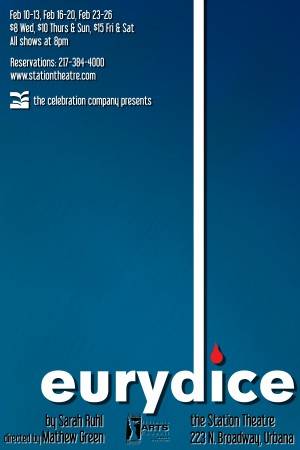Premiering this Thursday (Feb. 10) at the Station Theatre in downtown Urbana is the play, Eurydice, written by Sarah Ruhl. I had the opportunity to interview director and co-producer, Mathew Green. Here’s what he had to say.
 Smile Politely: Eurydice is based on the ancient Greek myth, “Orpheus in the Underworld.” Can you give a brief recount of this myth and describe how playwright, Sarah Ruhl, alters its storyline?
Smile Politely: Eurydice is based on the ancient Greek myth, “Orpheus in the Underworld.” Can you give a brief recount of this myth and describe how playwright, Sarah Ruhl, alters its storyline?
Mathew Green: In the original myth, Eurydice married Orpheus, the greatest musician in the world, and was soon after set upon by a satyr. In her efforts to escape, Eurydice fell into a nest of vipers and she suffered a fatal bite. Then Orpheus traveled to the land of the dead and, with his music, softened both Hades’ and Persephone’s hearts, who agreed to allow Eurydice to return with him to earth on one condition: he should walk in front of her and not look back until they both had reached the upper world. He set off with Eurydice following, and, in his anxiety, as soon as he reached the upper world, he turned to look at her, forgetting that both needed to be in the upper world, and she vanished for the second time, but now forever.
In Ruhl’s version, the framework of the myth remains, but she uses it to create an original story. As in the original myth, Eurydice marries Orpheus, suffers a tragic death, and goes to the underworld. And, as in the original myth, Orpheus tries to bring her back. But — as the title implies — this play tells the story from Eurydice’s perspective. There is a Hades-like character, but this is a very different interpretation. Also, I think it’s safe to say that the characters have been updated. These are versions of the original archetypes, but they’re very relatable to a modern audience.
Smile Politely: Given that the story is told from the perspective of Eurydice, (as opposed to Orpheus) how do you feel this alteration impacts the play as a whole? Is Ruhl attempting to forward any social commentary through her retelling of this myth?
Mathew Green: I don’t think there’s an “agenda” at work, but I do think it’s imaginative to turn a classic story inside-out. The idea is similar, the story is familiar, but this is an original work. In this version, Eurydice isn’t a character who suffers and has to be saved by a male hero; she is the focal point, and this is her adventure, dealing with her feelings and her choices.
Smile Politely: I am aware that Ruhl writes Eurydice’s father into the play. Does the presence of Eurydice’s father overshadow the importance, or undermine the solidity of her relationship with Orpheus?
Mathew Green: The basic elements of the Orpheus/Eurydice relationship remain, but now she’s not someone’s wife; she’s her own woman, who happens to be married. By introducing and exploring her relationship with her father, the playwright creates a beautiful juxtaposition of romantic love vs. the bonds between parent and child. It takes Eurydice out of the victim role and allows her to make some very difficult decisions.
Smile Politely: The Underworld appears to be a radically different place in this play compared to paintings and descriptions of the ancient Greek Underworld. Can you explain how Ruhl chooses to alter the Underworld and how you plan to represent her vision on stage?
Mathew Green: There are so many different interpretations of the underworld, or hell. In Ruhl’s play, the stage directions call for something akin to Alice in Wonderland. We took that idea and adapted it to both our production and our theatre. Eric Burton, the set designer, has created a sort of basement/Wonka/playground. He’s an eccentric genius. We have trapdoors, an elevator that rains….
Smile Politely: What significance (if any) do you feel this play has in our community? That is, why did you bring this play to CU at the time that you did? Is there anything you want the audience to walk away thinking or feeling?
Mathew Green: First, I think a play is too beautiful and heartfelt not to be performed. It’s kind of stunning. But I really think Champaign-Urbana is an ideal environment for this kind of play. We have a diverse theatre community, and Eurydice has something for everyone. It has a classic, literary background, and it tells an emotional, heartwarming story in a truly bizarre way. It makes for a very entertaining, very theatrical experience. Honestly, plays like this are the reason we go to the theatre. It has so much emotion, and so much love, and yet it has truly creepy elements. It’s like a dark, romantic fairy tale. I think young audiences will enjoy its more comic and campy moments, I think parents will connect with its father/daughter storyline, and I think opening the week before Valentine’s Day is perfect timing. As for what audiences will think or feel, I think there are a lot of possibilities, but I will say that I’ve never seen a show quite like ours.








